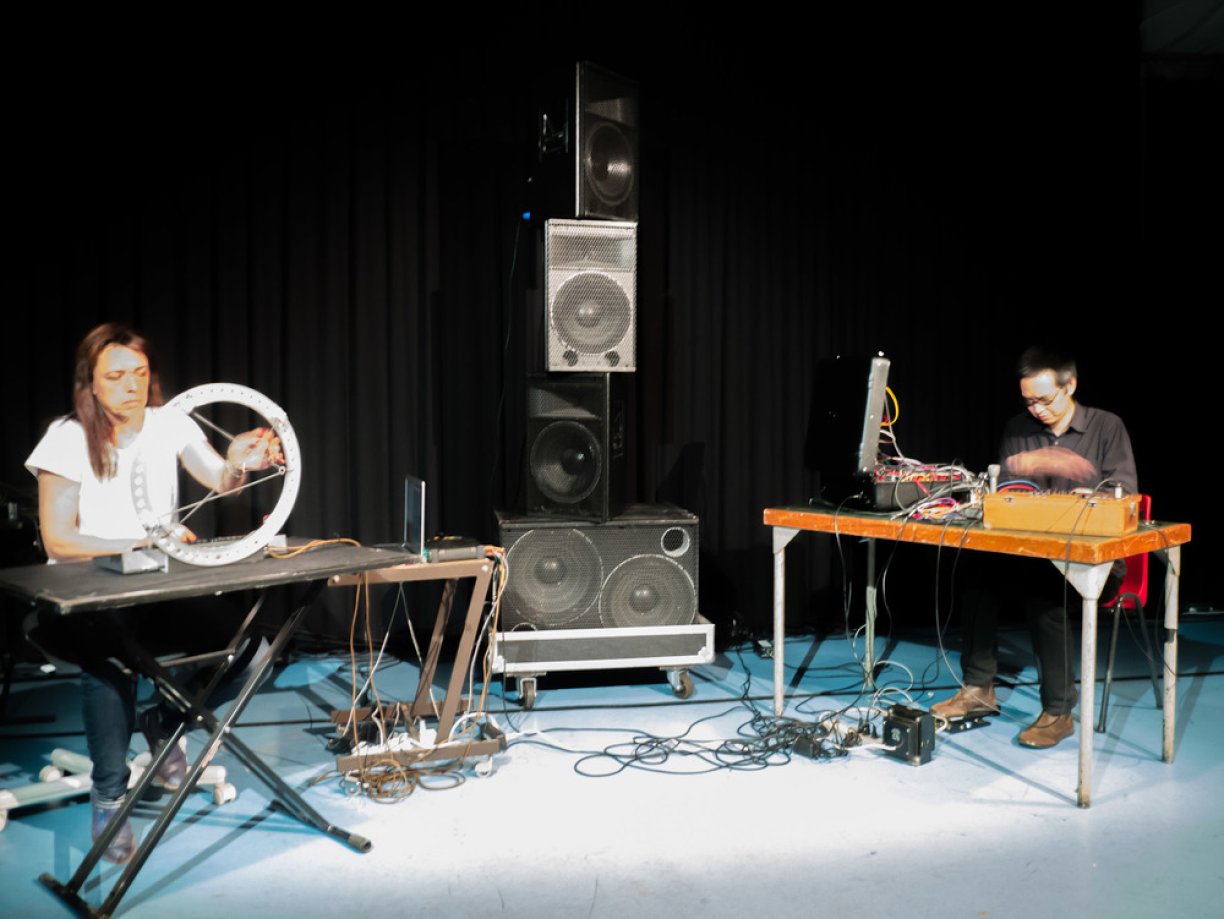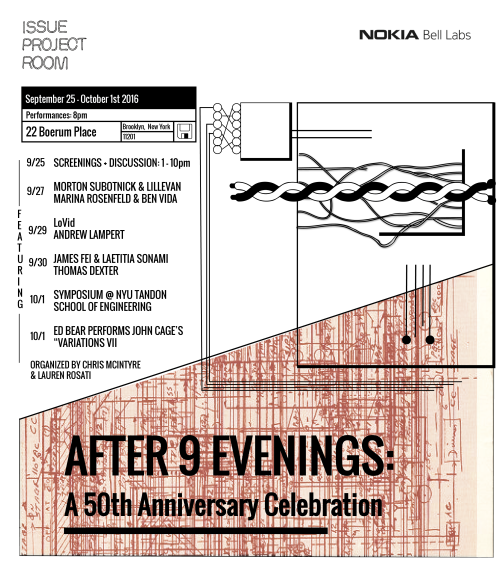From September 25 to October 1, 2016 ISSUE Project Room presents After 9 Evenings: A 50th Anniversary Celebration, a dynamic series of performances, talks, screenings, and workshops to mark the 50th anniversary of 9 Evenings: Theatre & Engineering (1966).
James Fei and Laetitia Sonami started their improvisational collaboration in 2013. While the materials and techniques used by the two musicians differ significantly, both employ tactile interfaces coupled with electronic systems that exhibit complex behavioral responses. Sonami performs with her most recent instrument, the Spring Spyre. Constructed around a web of springs whose signals are analyzed through neural networks which in turn control the audio synthesis in real time, the Spring Spyre can exhibit a wide range of sonic behaviors depending on its training terrains. Fei's setup consists of a mix of old modular equipment and homebrewed circuits. The system is driven by multiple feedback loops, often on the brink of instability. Signals are recursively routed through microphones, spring reverb, and converted between audio and control voltages. Circuit elements are also modified by touch, integrating the immediacy of the body with electronic processes.
Thomas Dexter’s performance work, best understood as a type of “live-filmmaking,” begins with the poetics of cinema as a vector for exploring physical translations and discursive negotiations between image and sound, signal and noise, and more broadly, representational systems. Along the way, various apparatuses of image and sound production are disarticulated and function is aggressively reframed. 16mm film loops are animated live and then destroyed, flicker patterns are created between asynchronous optical shutters, objects are fashioned into "expanded" screens, film and video chaotically interfere, and an evolving palette of tonal and textural sounds are extracted from disparate nodes within this process.
James Fei (b. Taipei, Taiwan) moved to the US in 1992 to study electrical engineering. He has since been active as a composer and performer on saxophones and live electronics. Works by Fei have been performed by the Bang on a Can All-Stars, Orchestra of the S.E.M. Ensemble, MATA Micro Orchestra and Noord-Hollands Philharmonisch Orkest. Recordings can be found on Leo Records, Improvised Music from Japan, CRI, Krabbesholm and Organized Sound. Compositions for Fei's own ensemble of four alto saxophones focus on physical processes of saliva, fatigue, reeds crippled by cuts, and the threshold of audible sound production, while his sound installations and performance on live electronics often focus on electro-acoustic feedback. Since 2006 Fei has taught at Mills College in Oakland, where he is Associate Professor of Electronic Arts and Program Head of Art and Technology.
Laetitia Sonami (b. France) settled in the United States in 1975 to pursue her interests in live electronic music. She studied with Eliane Radigue, Joel Chadabe, Robert Ashley and David Behrman. Sonami's sound performances, live-film collaborations, and sound installations focus on issues of presence and participation. She has devised new gestural controllers for performance and applies new technologies and appropriated media to achieve an expression of immediacy through sound, place and objects. Sonami is best known for her unique instrument, the elbow-length lady's glove, which is fitted with an array of sensors tracking the slightest motion of her hand and body. Sonami performs worldwide and received numerous awards among which the Herb Alpert Awards in the Arts and the Foundation for Contemporary Performance Awards. Sonami lives in Oakland, California and teaches at SFAI and the Bard MFA Music program.
Thomas Dexter is an interdisciplinary artist based in Chicago and New York. Dexter’s solo and collaborative projects, spanning video works, experimental film, performance, and sound installation, have been exhibited, screened, and performed at venues internationally, including the Soloman R. Guggenheim Museum NYC, Microscope Gallery, Experimental Intermedia, PS1/MOMA, Roulette, The New York Museum of Art and Design, Sight and Sound Festival, Issue Project Room, the Mononoaware Festival, The Lesley Heller Workspace, The Invisible Dog, and ESP TV among others. Dexter studied Psychology at Bennington College and is currently an MFA candidate at The School of the Art Institute of Chicago. Dexter works as a “professional” filmmaker and sometimes assistant to experimental filmmaker and media artist Ernie Gehr.


